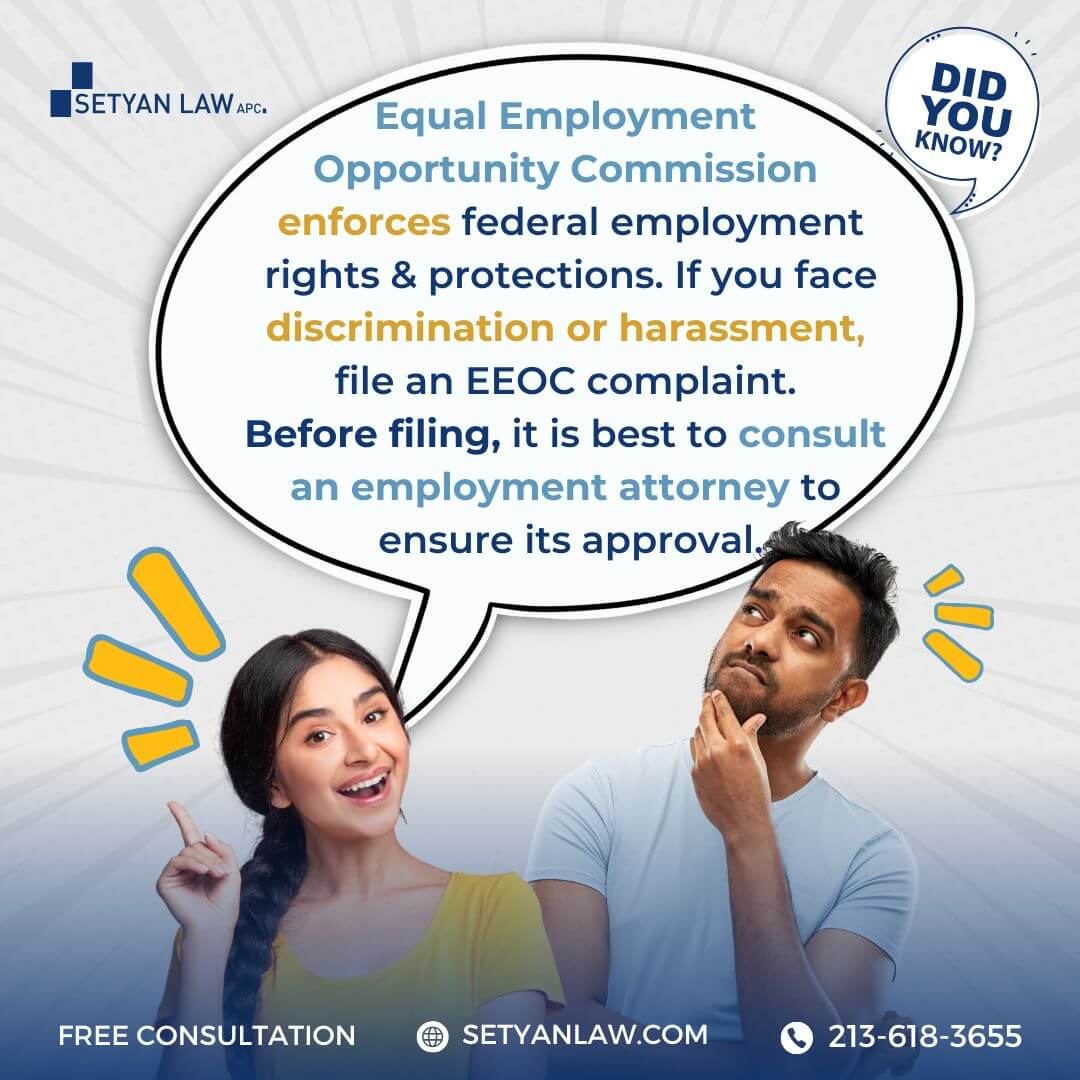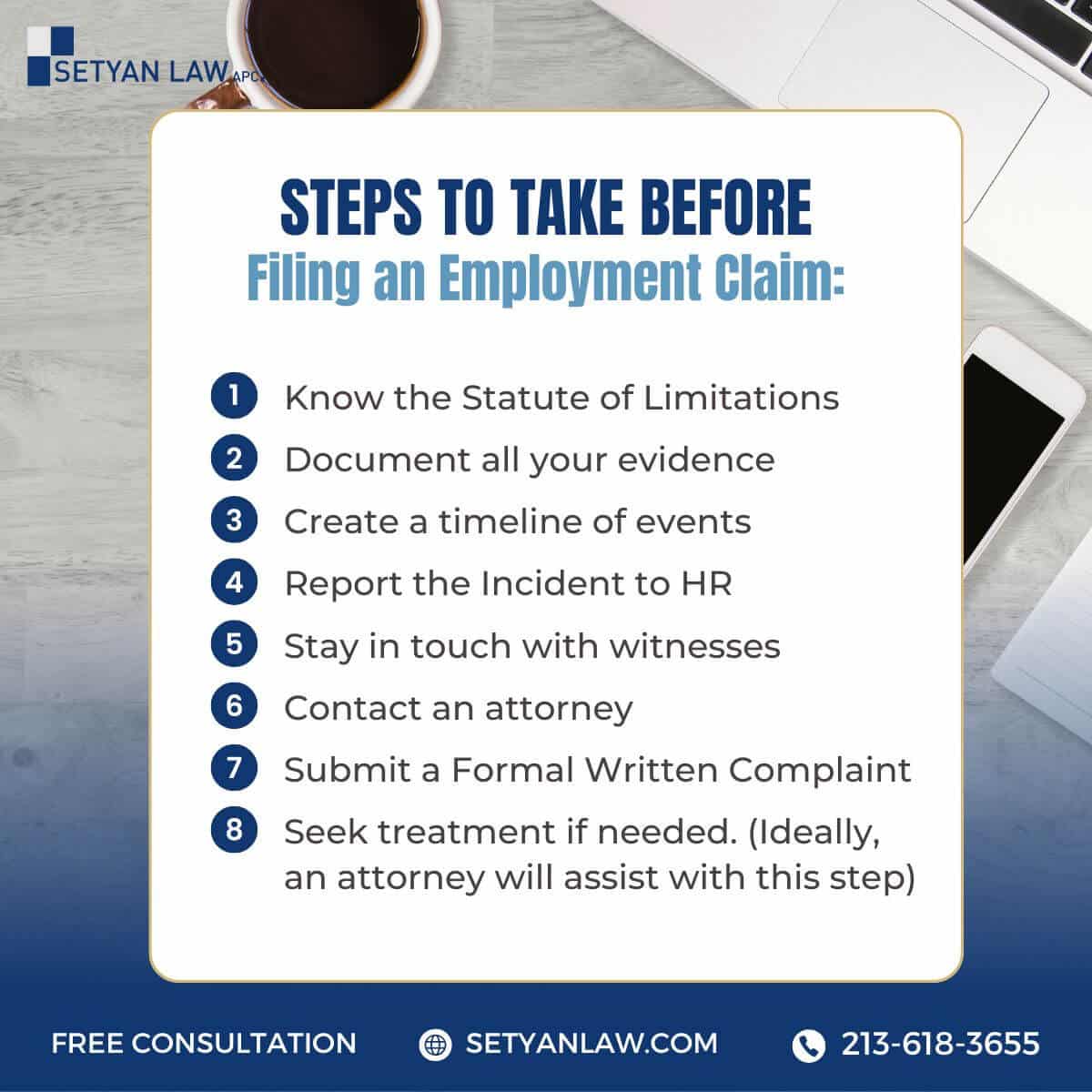Updated June 10, 2025
The Benefits of Legal Representation in EEOC Complaints
Engaging an attorney to assist with your EEOC complaint offers numerous advantages that can significantly impact the outcome of your case. Let’s explore some of the key benefits of legal representation in this process.
Expert Navigation of Legal Procedures
The EEOC complaint process involves specific procedures and protocols that can be challenging for individuals unfamiliar with legal processes. An attorney well-versed in employment law can guide you through each step, ensuring that all necessary forms are completed accurately and submitted on time.
Protection Against Employer Retaliation
Filing an EEOC complaint can be intimidating, especially when you’re still employed by the company in question. While retaliation for filing a complaint is illegal, it’s not uncommon for employees to face subtle forms of backlash. Having legal representation sends a strong message to your employer and can help deter retaliatory actions.
Maximizing the Strength of Your Case
An experienced attorney knows how to frame your complaint in the most compelling way possible. They can help you articulate your experiences clearly and persuasively, increasing the likelihood that the EEOC will find merit in your case.
Negotiation and Settlement Expertise
If your employer is willing to engage in settlement discussions, having an attorney by your side can be invaluable. Legal professionals are skilled negotiators who can help you secure a fair resolution that addresses your grievances and compensates you appropriately for any damages suffered.
Understanding the EEOC Process
The Equal Employment Opportunity Commission serves as a federal agency tasked with enforcing civil rights laws against workplace discrimination. When an employee believes they have been subjected to unlawful treatment based on protected characteristics such as race, color, religion, sex, national origin, age, disability, or genetic information, they have the right to file a complaint with the EEOC.
The Complexity of Employment Law
Employment law is a multifaceted and ever-evolving field. What may seem like a straightforward case of discrimination to the layperson can involve intricate legal nuances that require expert interpretation. An experienced employment attorney possesses the knowledge to navigate these complexities, ensuring that your complaint is filed correctly and comprehensively.
Timelines and Deadlines
One of the most critical aspects of the EEOC process is adhering to strict timelines. Depending on your specific situation and location, you may have as little as 180 days from the date of the alleged discrimination to file your complaint. Missing these deadlines can result in the loss of your right to pursue legal action. An attorney can help you understand and meet these crucial deadlines, preserving your ability to seek justice.
Gathering and Presenting Evidence
Building a strong case requires more than just your word against your employer’s. It necessitates the collection and presentation of compelling evidence to support your claims. An attorney can guide you in gathering relevant documentation, identifying potential witnesses, and presenting your case in the most persuasive manner possible.
Understanding Your Rights and Options
The EEOC process offers various paths forward, including mediation, investigation, and potentially litigation. An experienced lawyer can explain these options in detail, helping you make informed decisions about the best course of action for your unique circumstances.
Common Misconceptions About EEOC Complaints
There are several misconceptions surrounding EEOC complaints that can lead individuals to make uninformed decisions. Let’s address some of these myths to provide clarity on the process.
Myth: The EEOC Will Represent You
Contrary to popular belief, the EEOC does not act as your personal attorney. While they investigate complaints and may take action against employers found to be in violation of the law, their primary role is to enforce federal anti-discrimination laws, not to advocate for individual complainants.
Myth: Filing a Complaint Guarantees a Favorable Outcome
Filing an EEOC complaint does not guarantee that you will receive compensation or that your employer will be found at fault. The process is designed to investigate claims of discrimination, but the outcome depends on the evidence presented and the specifics of your case.
Myth: You Can’t Work with Your Current Employer During the Process
Many employees fear that filing an EEOC complaint means they must leave their job. In reality, you have the right to continue working while your complaint is being processed. An attorney can advise you on how to navigate this potentially awkward situation professionally.
Myth: EEOC Complaints Are Only for Severe Cases of Discrimination
EEOC complaints can be filed for various forms of workplace discrimination, ranging from subtle biases to overt acts. An attorney can help you determine if your experiences qualify as actionable discrimination under federal law.
The EEOC Investigation Process
Understanding what happens after you file a complaint can help you prepare for the journey ahead. Let’s break down the typical stages of an EEOC investigation.
Initial Review and Acceptance
Once your complaint is filed, the EEOC will review it to ensure it falls within their jurisdiction and meets the basic requirements for investigation. An attorney can help ensure your complaint is complete and compelling from the outset.
Notification to the Employer
If your complaint is accepted, the EEOC will notify your employer of the charges against them. This is a critical moment where having legal representation can protect you from potential retaliation or intimidation tactics.
Employer’s Response
Your employer will have the opportunity to respond to the charges. An experienced attorney can anticipate potential defenses and help you prepare counterarguments in advance.
Investigation and Evidence Gathering
The EEOC will conduct an investigation, which may include interviews, document reviews, and on-site visits. Your attorney can help you prepare for any interviews and ensure that all relevant evidence is presented to the investigator.
Determination and Next Steps
Based on the investigation, the EEOC will make a determination. If they find reasonable cause to believe discrimination occurred, they may attempt conciliation between you and your employer. If conciliation fails, the EEOC may choose to file a lawsuit or issue you a "right to sue" letter.
Call Setyan Law at (213)-618-3655 to schedule a free consultation.
Preparing for Potential Litigation
While many EEOC complaints are resolved without going to court, it’s essential to be prepared for the possibility of litigation. An attorney can help you understand what to expect if your case proceeds to this stage.
Building a Strong Foundation
The information and evidence you provide during the EEOC process can significantly impact any future litigation. An attorney can help ensure that your complaint and all subsequent communications with the EEOC are consistent and supportive of a potential lawsuit.
Understanding the Transition from EEOC to Court
If the EEOC issues a "right to sue" letter, you typically have 90 days to file a lawsuit in federal court. This is a short window, and having an attorney already familiar with your case can be crucial in meeting this deadline and preparing a strong legal complaint.
Evaluating Settlement Offers
Throughout the process, your employer may offer to settle the case. An experienced attorney can help you evaluate these offers, ensuring that any settlement adequately addresses your grievances and compensates you fairly.
Preparing for Trial
If your case goes to trial, your attorney will be instrumental in preparing you for testimony, gathering additional evidence, and presenting your case to a judge or jury.
The Financial Aspects of Legal Representation
Concerns about the cost of legal representation often deter individuals from seeking an attorney’s help with their EEOC complaints. However, it’s important to understand the financial arrangements available and the potential long-term benefits of legal counsel.
Contingency Fee Arrangements
Many employment attorneys work on a contingency fee basis, meaning they only get paid if you win your case or receive a settlement. This arrangement can make legal representation accessible to individuals who might otherwise be unable to afford it.
Cost-Benefit Analysis
While there may be costs associated with legal representation, the potential benefits often outweigh these expenses. An attorney can help you recover damages you might not have known you were entitled to and can often negotiate higher settlements than individuals acting alone.
Long-Term Financial Implications
The outcome of your EEOC complaint can have significant long-term financial implications, affecting your career prospects and earning potential. Investing in legal representation can protect your financial future by ensuring the best possible outcome for your case.
Fee Structures and Transparency
Reputable attorneys will be transparent about their fee structures and any potential costs associated with your case. Don’t hesitate to discuss financial arrangements upfront and ensure you have a clear understanding of how fees will be handled.
Choosing the Right Attorney for Your EEOC Complaint
Selecting the right attorney to represent you in your EEOC complaint is a crucial decision that can significantly impact the outcome of your case. Here are some factors to consider when choosing legal representation.
Specialization in Employment Law
Look for an attorney who specializes in employment law and has specific experience with EEOC complaints. This specialized knowledge can be invaluable in navigating the complexities of your case.
Track Record of Success
Research the attorney’s track record in handling similar cases. Look for testimonials, case results, and any recognition they’ve received in the field of employment law.
Communication Style and Availability
Choose an attorney who communicates clearly and is responsive to your questions and concerns. The EEOC process can be lengthy, and you’ll want an advocate who keeps you informed throughout.
Personal Compatibility
You’ll be working closely with your attorney on a sensitive matter. Ensure you feel comfortable with them and confident in their ability to represent your interests effectively.
The Emotional Support Aspect of Legal Representation
Dealing with workplace discrimination can be emotionally draining. An often-overlooked benefit of legal representation is the emotional support and guidance an attorney can provide throughout the process.
Validation and Empowerment
An experienced employment attorney can validate your experiences and empower you to stand up for your rights. This emotional support can be crucial in maintaining your resolve throughout the complaint process.
Stress Reduction
Navigating the EEOC process can be stressful, especially when you’re dealing with the day-to-day realities of a hostile work environment. Having an attorney handle the legal aspects can significantly reduce your stress and allow you to focus on your well-being.
Confidentiality and Trust
Your attorney-client relationship is protected by confidentiality, providing a safe space to discuss sensitive matters related to your case. This trust can be invaluable as you navigate the emotional challenges of addressing workplace discrimination.
Guidance on Workplace Interactions
An attorney can advise you on how to handle workplace interactions during the complaint process, helping you maintain professionalism and protect your interests while the case is ongoing.
The Impact of Legal Representation on Case Outcomes
While every case is unique, statistical and anecdotal evidence suggests that legal representation can significantly impact the outcome of EEOC complaints and subsequent litigation.
Higher Settlement Amounts
Studies have shown that individuals represented by attorneys often receive higher settlement amounts than those who handle their cases independently. Lawyers’ negotiation skills and understanding of case value contribute to this advantage.
Increased Likelihood of Favorable Outcomes
Cases with legal representation are more likely to result in findings of discrimination or successful conciliation. Attorneys’ expertise in presenting evidence and arguing legal points contributes to this increased success rate.
Comprehensive Remedies
Attorneys can help secure more comprehensive remedies beyond monetary compensation, such as policy changes, training requirements, or reinstatement to your position.
Long-Term Impact on Workplace Culture
Successfully litigated cases can have a broader impact on workplace culture, potentially preventing future instances of discrimination and improving conditions for other employees.
Conclusion: Making an Informed Decision
Deciding whether to seek legal representation for your EEOC complaint is an important decision that depends on various factors, including the complexity of your case, the time involved, potential damages involved, and your experience navigating legal processes.
However, given the intricate nature of employment law, the potential for significant long-term impacts on your career and financial well-being, and the emotional toll of addressing workplace discrimination, consulting with an experienced employment attorney before filing an EEOC complaint is the wise decision.
By enlisting the help of a knowledgeable legal professional, you can ensure that your rights are protected, your case is presented in the strongest possible light, and you have the support and guidance necessary to navigate this challenging process. Remember, the goal is not just to file a complaint, but to achieve justice and create positive change in your workplace. With the right legal representation, you can approach this goal with confidence and the best possible chance of success.
Need an Employment Lawyer?
Discuss the possibility of filing a strong employment case with an expert employment law attorney. No fee until you win.








